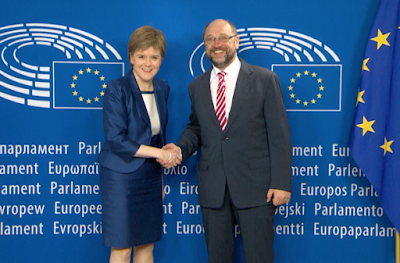Brexit has
become a colossal earthquake. It has provoked that two key events
that occurred a few days later went almost unnoticed. I refer to the
presentation of the EU Global Strategy document and the powerful NATO
Warsaw summit. Both events seemed to concentrate much attention,
until the unexpected outcome happened.
One of the key outcomes was Scotland's. If Brexit won by 51,9% in the whole UK, by nations, the reality was very different. In England (53,4%) and Wales (52.5%) Brexit triumphed, while in Scotland, with a brutal 62%, and in Northern Ireland (55.8%), Bremain won.
One of the key outcomes was Scotland's. If Brexit won by 51,9% in the whole UK, by nations, the reality was very different. In England (53,4%) and Wales (52.5%) Brexit triumphed, while in Scotland, with a brutal 62%, and in Northern Ireland (55.8%), Bremain won.
The Scottish
result, needless to say, was the most striking. Less than two years
after the referendum of self-determination, won by unionist, largely
using the argument of fear and international isolation, the new
scenario dooms Scotland to exit from EU, if it continues within the
UK. A clear example of minorisation, since the democratic will of the
Scottish Nation may end up being totally ignored.
Naturally, Scottish FM, Ms. Nicola Sturgeon considered this scenario totally unacceptable, and added that the possibility of a new indyref was worth to be studied carefully, taken into account the departure of the UK from the EU. And not only that, since she rushed to move to Brussels and met with two of the most important European politicians: the President of Parliament, and eternal chameleon, Martin Schulz, and the controversial and increasingly critized, President of the European Commission, Jean-Claude Juncker. In both cases she was received under a barrage of camera flashes that reached a worldy coverage. Ms Sturgeon, however, failed to meet with President of the European Council, Donald Tusk, who claimed scheduling problems.
Naturally, Scottish FM, Ms. Nicola Sturgeon considered this scenario totally unacceptable, and added that the possibility of a new indyref was worth to be studied carefully, taken into account the departure of the UK from the EU. And not only that, since she rushed to move to Brussels and met with two of the most important European politicians: the President of Parliament, and eternal chameleon, Martin Schulz, and the controversial and increasingly critized, President of the European Commission, Jean-Claude Juncker. In both cases she was received under a barrage of camera flashes that reached a worldy coverage. Ms Sturgeon, however, failed to meet with President of the European Council, Donald Tusk, who claimed scheduling problems.
Sturgeon
proposed that, temporarily, until a new indyref takes place, a
“Greenland in reverse” solution deserved to be analyzed.
By this, she was referring to the fact that Greenland, an autonomous
territory of Denmark, a EU member state, decided to get out, and
since 1985, Greenland, even though under Danish sovereignty, is
considered an EU associated territory. Thus, Scotland would remain a
member of the EU, and at the same time, until a second indyref takes
place, continue to be part of a non EU member UK.
This proposal and, in general, all the fuss that generated the Scottish theme, triggered all the alarms of the Spanish government, who show its fully opposition to this proposal, and particularly to the fact that Scotland remains in the EU once UK exited from it. The reason is obviously that this proposal opens a wide open door for the Catalonia case.
This proposal and, in general, all the fuss that generated the Scottish theme, triggered all the alarms of the Spanish government, who show its fully opposition to this proposal, and particularly to the fact that Scotland remains in the EU once UK exited from it. The reason is obviously that this proposal opens a wide open door for the Catalonia case.
It must be
stressed that the proposal of Scotland EU membership, received a
surprisingly friendly reception in certain European circles: in
France, Germany and Poland in particular. I do not mean official
reactions at the highest level, but in certain political circles, in
academic and research institutes. Something totally unexpected,
showing that European politics is a game where pragmatism dominates
well above the legal texts, considered by others as untouchables,
almost sacred.
As expected,
Scotland politicians resorted to the well-known argument, used in the
Kosovo case, stating that its case is unique
and not applicable to other cases, so as to disassociate themselves
from the case of Catalonia, trying to avoid the more than certain
Spanish veto to Scotland EU membership. A veto, however, that will
never take place, because Spain is unable to veto anything in Europe
once the major European partners are opposed, that is, without its
permission.
In short, Brexit has opened a huge door for Catalonia. Probably the most significant impact is in a psychological scale. What seemed impossible is possible. It is a lesson that we must learn and remember. Catalonia President, Carles Puigdemont, proved right when he declared previously to the referendum day, that Catalonia must follow very close the campaing because it opened many expectations.
In short, Brexit has opened a huge door for Catalonia. Probably the most significant impact is in a psychological scale. What seemed impossible is possible. It is a lesson that we must learn and remember. Catalonia President, Carles Puigdemont, proved right when he declared previously to the referendum day, that Catalonia must follow very close the campaing because it opened many expectations.




Cap comentari:
Publica un comentari a l'entrada